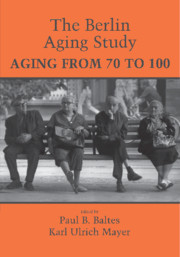Book contents
- Frontmatter
- Contents
- Acknowledgments
- Introduction
- Part A Theoretical Orientations and Methods
- Part B Major Results from the Four Research Units
- Part C Interdisciplinary Findings
- 9 Men and Women in the Berlin Aging Study
- 10 Social Relationships in Old Age
- 11 Self, Personality, and Life Regulation: Facets of Psychological Resilience in Old Age
- 12 Limits and Potentials of Intellectual Functioning in Old Age
- 13 Sensory Systems in Old Age
- 14 Everyday Competence in Old and Very Old Age: Theoretical Considerations and Empirical Findings
- 15 On the Significance of Morbidity and Disability in Old Age
- 16 The Utilization of Medical and Nursing Care in Old Age
- 17 Sources of Well-Being in Very Old Age
- Part D Overview and Outlook
- Notes on Contributors
- Abbreviations
- Author Index
- Subject Index
15 - On the Significance of Morbidity and Disability in Old Age
Published online by Cambridge University Press: 06 December 2010
- Frontmatter
- Contents
- Acknowledgments
- Introduction
- Part A Theoretical Orientations and Methods
- Part B Major Results from the Four Research Units
- Part C Interdisciplinary Findings
- 9 Men and Women in the Berlin Aging Study
- 10 Social Relationships in Old Age
- 11 Self, Personality, and Life Regulation: Facets of Psychological Resilience in Old Age
- 12 Limits and Potentials of Intellectual Functioning in Old Age
- 13 Sensory Systems in Old Age
- 14 Everyday Competence in Old and Very Old Age: Theoretical Considerations and Empirical Findings
- 15 On the Significance of Morbidity and Disability in Old Age
- 16 The Utilization of Medical and Nursing Care in Old Age
- 17 Sources of Well-Being in Very Old Age
- Part D Overview and Outlook
- Notes on Contributors
- Abbreviations
- Author Index
- Subject Index
Summary
Evidence from gerontological research suggests that physical morbidity and disability in old age are among the most important causes for decline in other functional domains such as social and psychological functioning. However, comprehensive cross-disciplinary analyses on the significance of morbidity and disability in old age and during transition into very old age are scarce.
This chapter examines the strength of associations between (a) somatic and mental health, (b) health and psychosocial status, and (c) objective and subjective health by utilizing multidimensional indicators of physical, mental, psychological, and social functioning from the Berlin Aging Study (BASE) sample (N = 516; age range: 70–103 years). The analyses focus on two central questions, namely: (1) To what extent is health an explanatory variable for age differences in other functional domains? (2) Do the associations between health and other domains themselves vary with age?
The results reveal clear age-independent correlations between somatic and psychiatric morbidity as well as between psychosocial factors and health. Moreover, health indicators fully explain the negative effects of age on psychosocial resources and on mental health. However, the significance of objective health for subjective evaluations decreases significantly with age. In this domain, the findings are consistent with recent hypotheses that emphasize manifold intraindividual mechanisms working to maintain positive self-appraisal despite objective decline.
Introduction
Systemic Aspects of Morbidity and Disability in Old Age
Even if old age is not necessarily associated with illness, physical and mental morbidity and disability are prevalent ailments in late life.
- Type
- Chapter
- Information
- The Berlin Aging StudyAging from 70 to 100, pp. 403 - 429Publisher: Cambridge University PressPrint publication year: 1998



